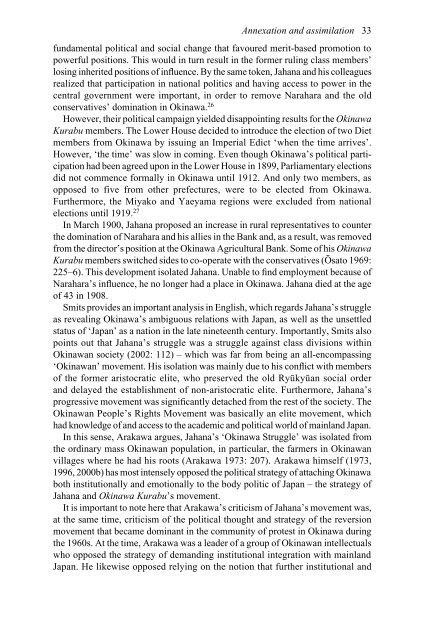Myth, Protest and Struggle in Okinawa
Myth, Protest and Struggle in Okinawa
Myth, Protest and Struggle in Okinawa
You also want an ePaper? Increase the reach of your titles
YUMPU automatically turns print PDFs into web optimized ePapers that Google loves.
Annexation <strong>and</strong> assimilation 33<br />
fundamental political <strong>and</strong> social change that favoured merit-based promotion to<br />
powerful positions. This would <strong>in</strong> turn result <strong>in</strong> the former rul<strong>in</strong>g class members’<br />
los<strong>in</strong>g <strong>in</strong>herited positions of <strong>in</strong>fluence. By the same token, Jahana <strong>and</strong> his colleagues<br />
realized that participation <strong>in</strong> national politics <strong>and</strong> hav<strong>in</strong>g access to power <strong>in</strong> the<br />
central government were important, <strong>in</strong> order to remove Narahara <strong>and</strong> the old<br />
conservatives’ dom<strong>in</strong>ation <strong>in</strong> Ok<strong>in</strong>awa. 26<br />
However, their political campaign yielded disappo<strong>in</strong>t<strong>in</strong>g results for the Ok<strong>in</strong>awa<br />
Kurabu members. The Lower House decided to <strong>in</strong>troduce the election of two Diet<br />
members from Ok<strong>in</strong>awa by issu<strong>in</strong>g an Imperial Edict ‘when the time arrives’.<br />
However, ‘the time’ was slow <strong>in</strong> com<strong>in</strong>g. Even though Ok<strong>in</strong>awa’s political participation<br />
had been agreed upon <strong>in</strong> the Lower House <strong>in</strong> 1899, Parliamentary elections<br />
did not commence formally <strong>in</strong> Ok<strong>in</strong>awa until 1912. And only two members, as<br />
opposed to five from other prefectures, were to be elected from Ok<strong>in</strong>awa.<br />
Furthermore, the Miyako <strong>and</strong> Yaeyama regions were excluded from national<br />
elections until 1919. 27<br />
In March 1900, Jahana proposed an <strong>in</strong>crease <strong>in</strong> rural representatives to counter<br />
the dom<strong>in</strong>ation of Narahara <strong>and</strong> his allies <strong>in</strong> the Bank <strong>and</strong>, as a result, was removed<br />
from the director’s position at the Ok<strong>in</strong>awa Agricultural Bank. Some of his Ok<strong>in</strong>awa<br />
Kurabu members switched sides to co-operate with the conservatives (Ōsato 1969:<br />
225–6). This development isolated Jahana. Unable to f<strong>in</strong>d employment because of<br />
Narahara’s <strong>in</strong>fluence, he no longer had a place <strong>in</strong> Ok<strong>in</strong>awa. Jahana died at the age<br />
of 43 <strong>in</strong> 1908.<br />
Smits provides an important analysis <strong>in</strong> English, which regards Jahana’s struggle<br />
as reveal<strong>in</strong>g Ok<strong>in</strong>awa’s ambiguous relations with Japan, as well as the unsettled<br />
status of ‘Japan’ as a nation <strong>in</strong> the late n<strong>in</strong>eteenth century. Importantly, Smits also<br />
po<strong>in</strong>ts out that Jahana’s struggle was a struggle aga<strong>in</strong>st class divisions with<strong>in</strong><br />
Ok<strong>in</strong>awan society (2002: 112) – which was far from be<strong>in</strong>g an all-encompass<strong>in</strong>g<br />
‘Ok<strong>in</strong>awan’ movement. His isolation was ma<strong>in</strong>ly due to his conflict with members<br />
of the former aristocratic elite, who preserved the old Ryūkyūan social order<br />
<strong>and</strong> delayed the establishment of non-aristocratic elite. Furthermore, Jahana’s<br />
progressive movement was significantly detached from the rest of the society. The<br />
Ok<strong>in</strong>awan People’s Rights Movement was basically an elite movement, which<br />
had knowledge of <strong>and</strong> access to the academic <strong>and</strong> political world of ma<strong>in</strong>l<strong>and</strong> Japan.<br />
In this sense, Arakawa argues, Jahana’s ‘Ok<strong>in</strong>awa <strong>Struggle</strong>’ was isolated from<br />
the ord<strong>in</strong>ary mass Ok<strong>in</strong>awan population, <strong>in</strong> particular, the farmers <strong>in</strong> Ok<strong>in</strong>awan<br />
villages where he had his roots (Arakawa 1973: 207). Arakawa himself (1973,<br />
1996, 2000b) has most <strong>in</strong>tensely opposed the political strategy of attach<strong>in</strong>g Ok<strong>in</strong>awa<br />
both <strong>in</strong>stitutionally <strong>and</strong> emotionally to the body politic of Japan – the strategy of<br />
Jahana <strong>and</strong> Ok<strong>in</strong>awa Kurabu’s movement.<br />
It is important to note here that Arakawa’s criticism of Jahana’s movement was,<br />
at the same time, criticism of the political thought <strong>and</strong> strategy of the reversion<br />
movement that became dom<strong>in</strong>ant <strong>in</strong> the community of protest <strong>in</strong> Ok<strong>in</strong>awa dur<strong>in</strong>g<br />
the 1960s. At the time, Arakawa was a leader of a group of Ok<strong>in</strong>awan <strong>in</strong>tellectuals<br />
who opposed the strategy of dem<strong>and</strong><strong>in</strong>g <strong>in</strong>stitutional <strong>in</strong>tegration with ma<strong>in</strong>l<strong>and</strong><br />
Japan. He likewise opposed rely<strong>in</strong>g on the notion that further <strong>in</strong>stitutional <strong>and</strong>
















